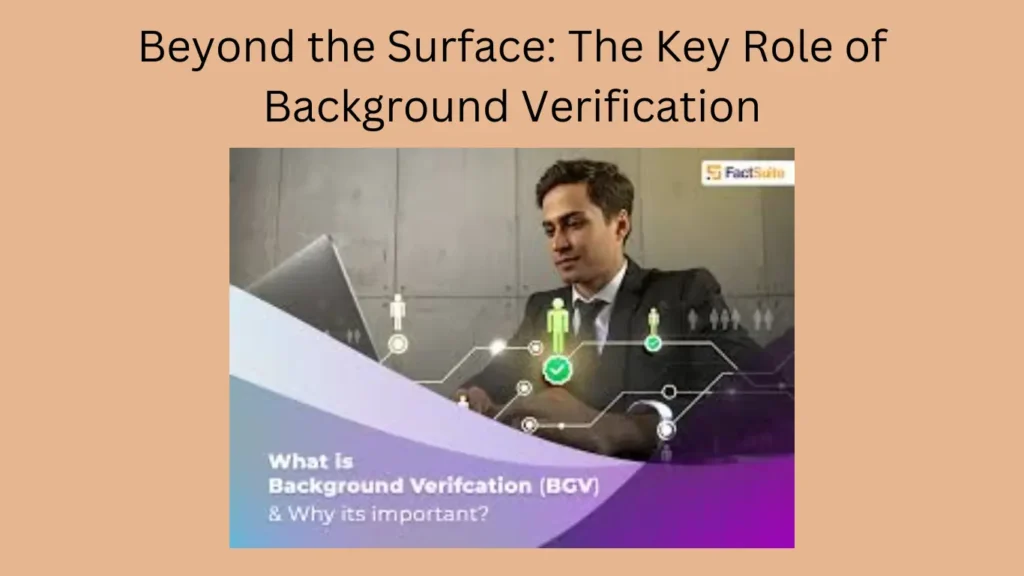In today’s fast-paced world, ensuring the safety and reliability of individuals in various sectors is more important than ever. Background verification has emerged as a crucial process to verify the authenticity of individuals’ credentials, providing peace of mind to employers, landlords, and even individuals. This article delves into the key role of background verification, highlighting its importance, processes, and benefits.
1. Understanding Background Verification
Why It Matters
- Ensuring the authenticity of information helps prevent fraud, ensures safety, and builds trust.
2. Importance of Background Verification
For Employers
- Hiring Right: Helps in selecting candidates with verified qualifications and experience.
- Workplace Safety: Reduces the risk of workplace violence or theft.
For Landlords
- Tenant Screening: Ensures tenants are reliable and have a good rental history.
- Property Safety: Protects property from potential damages by verifying tenant backgrounds.
For Individuals
- Personal Safety: Ensures that the people you interact with, like nannies or roommates, are trustworthy.
- Professional Integrity: Validates your credentials and work history to potential employers or clients.
3. Key Components of Background Verification
Identity Verification
- Confirms the individual’s identity through documents like passports, driver’s licenses, or national IDs.
Employment History
- Verifies previous employment details, job titles, and reasons for leaving.
Educational Background
- Checks the authenticity of academic qualifications and institutions attended.
Criminal Record Check
- Searches for any criminal history to ensure the individual’s legal standing.
Credit History
- Assesses financial reliability, especially relevant for positions involving financial transactions.
4. The Background Verification Process
Step-by-Step Guide
- Initial Application
- Collect basic information from the individual, including personal details and consent for background checks.
- Identity Verification
- Use official documents to confirm identity and prevent identity fraud.
- Reference Checks
- Contact previous employers or educational institutions to verify employment and educational history.
- Criminal Record Search
- Utilize legal databases to check for any criminal records.
- Credit Check (if applicable)
- Review financial history to assess reliability.
- Final Report
- Compile all findings into a comprehensive report for review.
5. Benefits of Background Verification
Enhanced Safety
- Reduces risks associated with hiring or interacting with individuals with undisclosed criminal backgrounds.
Informed Decision-Making
- Provides critical information that aids in making informed hiring or renting decisions.
Compliance and Legal Protection
- Ensures adherence to legal requirements, protecting organizations from potential lawsuits.
Trust and Reliability
- Builds trust between employers, landlords, and individuals, ensuring a safer and more reliable environment.
Conclusion
Whether for employment, tenancy, or personal interactions, thorough background checks provide peace of mind and protect against potential risks. By understanding its importance and implementing a structured verification process, individuals and organizations can make informed decisions and foster a secure environment.
For further Inquires Contact Us
FAQs
1. Why is background verification important for employers?
- Background verification helps employers ensure they are hiring individuals with verified qualifications, reducing the risk of workplace fraud, violence, and theft.
2. What does a typical background verification process include?
- The process includes identity verification, employment history checks, educational background checks, criminal record searches, and sometimes credit history reviews.
3. How does background verification benefit landlords?
- It helps landlords screen potential tenants, ensuring they have a good rental history and can be trusted to protect the property and pay rent on time.
4. Are background checks legal and compliant with privacy laws?
- Yes, background checks are legal when conducted with the individual’s consent and in compliance with local and international data protection and privacy laws.
5. Can individuals conduct background checks on personal hires, like nannies or roommates?
- Yes, individuals can use background verification services to ensure the safety and reliability of personal hires, providing peace of mind in personal interactions.
